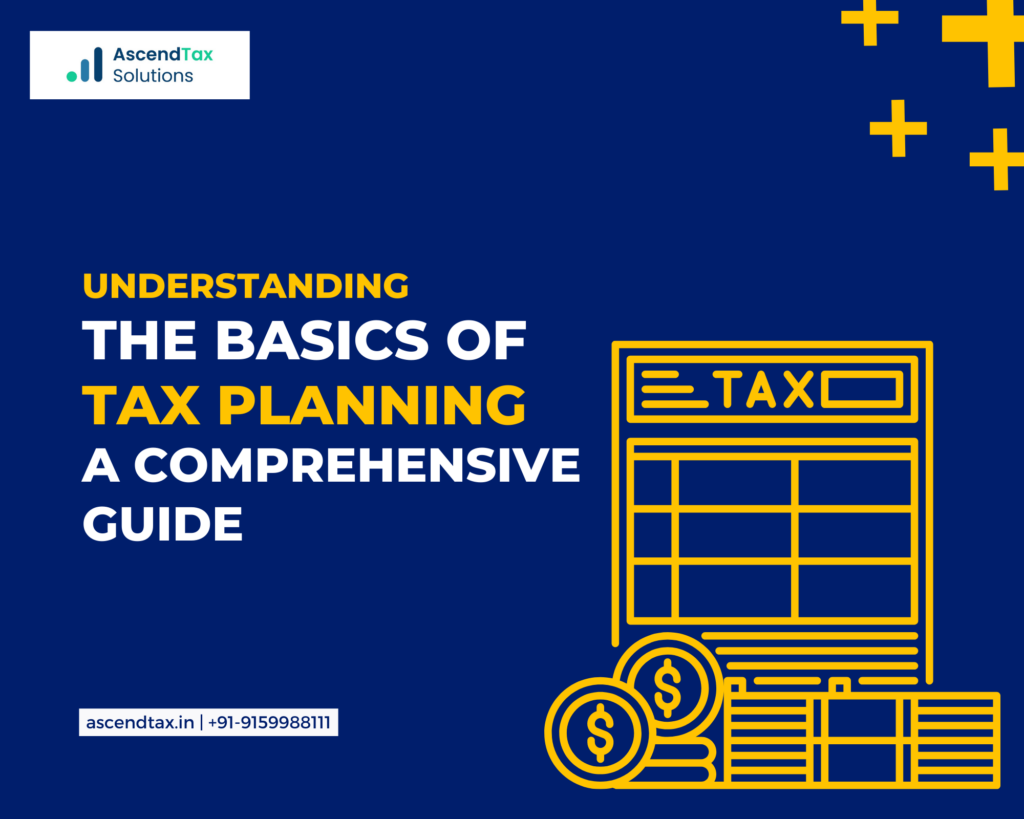
Tax planning plays a pivotal role in financial management for individuals and businesses in India. By strategically managing finances and leveraging various tax provisions, taxpayers can minimize their tax liabilities while ensuring compliance with the country’s tax laws. This article aims to provide an in-depth guide to understanding the basics of tax planning, encompassing key concepts, strategies, and important considerations.
Familiarize Yourself with the Indian Tax System:
To embark on effective tax planning, it is essential to have a comprehensive understanding of the tax system. Salaried Individuals are primarily subject to income tax, while Individual and Companies who are into businesses, Providing Services are liable for taxes such as corporate tax, Income Tax and goods and services tax (GST). Understanding the nuances of these taxes, their respective provisions, and the applicable rates will form the foundation of your tax planning efforts.
Read More: Familiarize Yourself with the Indian Tax System
Assess Your Income and Categorize It:
The first step in tax planning is to assess your income from various sources and categorize it appropriately. Individuals may have income from salaries, investments, capital gains, rental properties, or other sources. Understanding the different sources of income and the relevant tax treatment will help you devise appropriate strategies to optimize your tax planning.
Read More: Assess Your Income
Identify Eligible Deductions and Exemptions:
One of the key aspects of tax planning is identifying deductions and exemptions that can reduce your taxable income. In India, there are several deductions available under different sections of the Income Tax Act. Examples include deductions for investments in instruments like Employee Provident Fund (EPF), Public Provident Fund (PPF), National Pension System (NPS), and life insurance premiums. Additionally, exemptions are available for categories such as house rent allowance (HRA), medical expenses, and education loans. Understanding and utilizing these deductions and exemptions can significantly reduce your tax burden.
Read More: Identify Eligible Deductions and Exemptions
Leverage Tax-Saving Investments:
Investing in tax-saving instruments is an effective strategy for minimizing tax liabilities while simultaneously building wealth. The Indian government offers tax incentives for investments in instruments such as Equity-Linked Saving Schemes (ELSS), Tax-Saver Fixed Deposits, and National Savings Certificates (NSC). These investments not only provide tax benefits but also offer opportunities for long-term wealth creation. By strategically allocating funds to tax-saving investments, individuals can optimize their tax planning and financial growth.
Read More: Leverage Tax-Saving Investments:
Plan for Retirement:
Retirement planning is an integral part of tax planning. In India, retirement-oriented schemes such as the National Pension System (NPS) and the Employees’ Provident Fund (EPF) offer tax benefits. By contributing to these schemes, individuals can secure their future while simultaneously reducing their tax liabilities. Understanding the retirement planning options available and their associated tax advantages is crucial for effective tax planning.
Read More: Tax Plan for Retirement
Comply with Goods and Services Tax (GST) Regulations:
For businesses in India, compliance with the Goods and Services Tax (GST) is of utmost importance. Effective tax planning for businesses involves understanding the GST framework, ensuring proper classification of goods and services, maintaining accurate records, and timely filing of GST returns. Compliance with GST regulations not only minimizes the risk of penalties but also optimizes tax positions for businesses.
Read More: Goods and Services Tax (GST)
Seek Professional Assistance:
Tax planning can become intricate, especially for individuals and businesses with complex financial situations. Engaging the services of a qualified tax professional or chartered accountant can provide invaluable guidance. They can help you navigate the complexities of tax planning, interpret tax laws, and identify the most effective strategies based on your specific circumstances. Professional assistance ensures that you optimize your tax planning while remaining compliant with the ever-evolving tax regulations.
Stay Updated with Changing Tax Regulations: Tax laws and regulations in India undergo regular changes. It is crucial to stay updated with the latest amendments and revisions to effectively plan.